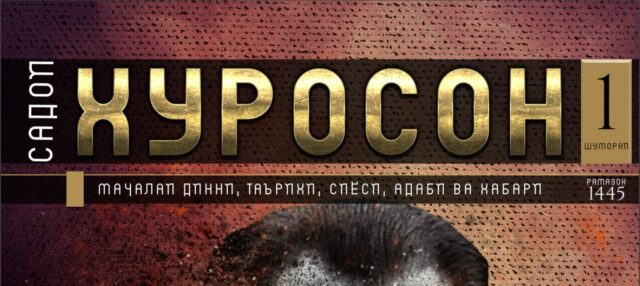
Geopolitical Report ISSN 2785-2598 Volume 41 Issue 4
Author: Giuliano Bifolchi
Executive Summary
The recent publication of the first issue of The Voice of Khurasan in the Tajik language underlined the Islamic State Wilayat Khurasan’s strategy to interest Tajik speakers in Central Asia and increase the pressure against Dushanbe’s government.
Overall, The Voice of Khurasan in the Tajik language represents a multifaceted threat to regional security, posing challenges not only for Tajikistan and Afghanistan/Pakistan but also for Russia and the broader Central Asian region.
Efforts to counter this propaganda and address the underlying grievances driving its appeal are essential to mitigate the risk of further destabilisation and violence.
Sadoi Khurasan: Background Information and Brief Analysis
On March 29th, 2024, the Al-Azaim Foundation, the media branch of the Islamic State Wilayat Khurasan, released the first issue of Sadoi Khurasan magazine (The Voice of Khurasan) in Tajik language addressed the Tajik speakers.
Looking at the table of contents, we can summarise the main topics discussed in the magazine as follows:
- Rahmon: Leader of Satan.
- Good News to the people – Mujahideen.
- This is the road to heaven.
- Tajik authorities are apostates and their government is a blasphemy.
- Information about Abu Muhammad al-Tajiki.
- A brief look at the history of the Caliphate.
- With your goods fight Jihad.
- Contacts for those who want to emigrate in the Islamic State or do Islamic jihad.
In brief, Saodi Khurasan delves into several contentious issues, notably critiquing Tajikistan’s President and its anti-Islamic State campaign, questioning the efficacy and motives behind such actions. It also sheds light on attempts to recruit Tajik youth from Tajikistan to Afghanistan.
It criticises the state of Tajikistan-Russia relations and praises a former IS-Khurasan Tajik commander, suggesting a glorification of extremist figures. The magazine attempts also to share contact information for the IS-Khurasan Tajik wing, facilitating further radicalisation and recruitment efforts.
Such content poses significant threats not only to Tajikistan but also to Afghanistan, India, and Russia, underscoring the transnational nature of the challenges posed by extremist ideologies.
The Voice of Khurasan’s Criticism against Emomali Rahmon, Central Asian nations and Russia

According to Sadoi Khurasan, throughout history, enemies of Islam have employed deception and trickery to undermine the Islamic community, leading many Muslims to turn away from their values and embrace worldly pursuits, forsaking their religion. Throughout history, enemies of Islam have repeatedly employed deception and trickery to undermine the Islamic community, leading many Muslims to turn away from their values and embrace worldly pursuits, forsaking their religion. As a result, various leaders, including Tajikistan’s President Emomali Rahmonov, faced accusations of apostasy.
The IS-Khurasan accuses Rahmonov’s ‘regime’ to have started a campaign to eradicate Islamic practices, encouraging behaviours contrary to religious teachings, such as promoting immorality and discouraging adherence to Islamic attire like the hijab. Under Rahmonov’s rule, Tajikistan witnessed a decline in religious observance among the younger generation, who were enticed by Westernised lifestyles and discouraged from practicing their faith.
The erosion of Islamic values culminated in restrictions on religious practices, such as delaying conversions to Islam until the age of eighteen and preventing Hajj pilgrimages before the age of fifty-five, while mosques were closed and religious identity suppressed.
The narrative urges the people of Tajikistan, particularly the youth, to resist the erosion of their religious identity and reclaim their Islamic heritage. It calls for a return to Islamic principles, denouncing Rahmonov’s regime as a betrayal of faith and urging adherence to the teachings of Islam. The text urges Tajikistan’s youth to reject the allure of democracy and secularism and instead advocate for the establishment of an Islamic state that upholds Islamic values.
It encourages resistance against oppression and calls for support for Mujahideen efforts to establish an Islamic state, emphasising the importance of preserving Islamic identity and combating disbelief and polytheism worldwide. Ultimately, the text serves as a call to action for Tajikistan’s Muslims to reclaim their religious heritage, resist oppression, and strive for the establishment of an Islamic state based on Islamic principles.
The magazine delves into the challenges posed by various regimes, questioning why Muslim-majority nations like Afghanistan, Tajikistan, Uzbekistan, Pakistan, and others, still have elements of secularism despite being Islamic nations. It raises concerns that these countries place limitations on mosques and religious practices, unlike non-Muslim nations where they permit them without restrictions.
The comparison sheds light on the dichotomy between Islamic and secular systems and calls for a deeper introspection into the compatibility of democratic principles with Islamic faith. It also cautions against blindly adopting foreign ideologies without considering their impact on the Islamic way of life.
Read also | Tajikistan’s 2023 in Review Between Government’s Optimism and the Country’s Challenges |
Religious teaching and the call to jihad
The magazine considers jihad a profound and blessed act, encompassing virtues found throughout the Holy Quran and the Hadiths of the Prophet Muhammad. It is a duty and a consistent practice, integral to the life of a Muslim, not just a mere ritual, but a multifaceted commitment.
On one hand, it includes individual acts like fasting, prayer, giving alms, and others, which establish a personal connection with the divine, promising rewards and spiritual growth. On the other hand, it extends to societal obligations, benefiting all individuals collectively. Its significance lies in preserving the dignity, wealth, religion, and intellect of Muslims, ensuring their safety and flourishing.
Moreover, the publication emphasises that the fruits of jihad are not always apparent to those who oppose it, but the Muslim community stands firm, knowing its worth. This steadfastness has led to the emergence of new systems, such as republics and secularism, reflecting the alignment of individual life with societal structures.
However, it warns against neglecting the true essence of jihad, which encompasses more than just performing obligatory prayers and rituals but also entails resistance against oppressive regimes and defending the Islamic way of life. It underscores the need for adherence to divine laws and principles, rather than blindly following man-made systems that may contradict Islamic teachings.
Although the establishment of mosques and educational institutions is part of the religion’s essence, the magazine discusses the insufficiency of merely constructing mosques and madrasas for establishing Islam globally. While such institutions exist in various non-Muslim countries, including Russia, the United States, and India, their presence alone does not ensure the establishment of Islamic systems.
The Voice of Khurasan highlights the contrast between Islamic governance, as envisioned by movements like the Taliban and historical Islamic rulers, and the systems prevalent in Uzbekistan, fallen governments in Pakistan, and other non-Muslim nations like the United States and Russia.
It questions whether these systems uphold the limits set by Allah and His Messenger and suggests that true adherence to Islamic principles is lacking in these political structures.
The publication argues against the blind pursuit of Islamic governance, suggesting that serving under non-Islamic systems may be necessary in certain circumstances. It questions the commitment of individuals to Islamic values within democratic frameworks, emphasising the need for alignment with Islamic principles in decision-making and governance.
Risk Assessment
The Voice of Khurasan in the Tajik language poses significant geopolitical and security risks in Central Asia and the Afghanistan/Pakistan region. The magazine’s content reflects the IS-Khurasan strategic intent to engage Tajik speakers and exert pressure on the government of Tajikistan.
By critiquing President Emomali Rahmon and questioning the efficacy of Tajikistan’s anti-Islamic State campaign, the publication seeks to sow dissent and radicalise Tajik youth, potentially destabilising the country.
Moreover, the inclusion of contact information for joining the Islamic State or taking part in jihadist activities indicates a concerted effort to recruit individuals and spread extremist ideologies, posing a direct threat to regional stability.
Given the significant Tajik migrant population in Russia, the dissemination of such radical propaganda might radicalise individuals within Russia, leading to security concerns for both countries.
Furthermore, the magazine’s call for resistance against oppression and support for establishing an Islamic state resonates with disenfranchised populations in Central Asia and beyond, potentially inspiring acts of violence or insurgency against existing governments.
Additionally, The Voice of Khurasan promotes a strict interpretation of jihad and challenges the compatibility of democratic principles with Islamic faith, further polarising communities and fostering distrust towards secular governance.
The publication’s critique of secular systems in Muslim-majority countries raises concerns about the erosion of democratic values and the potential for increased radicalisation among marginalised populations.
Listen also | Ep.10 – The Islamic State Wilayat Khorasan and the terrorist threat in Eurasia |
For further analyses and paid reports on terrorist propaganda and Islamic State activities, contact us at info@specialeurasia.com.



